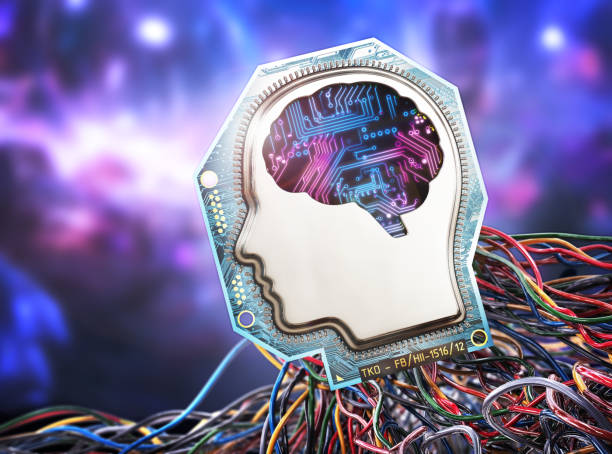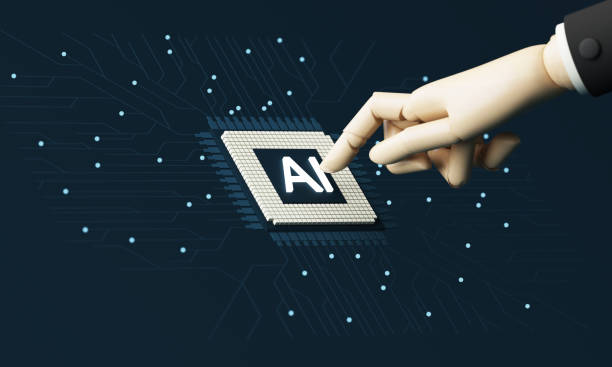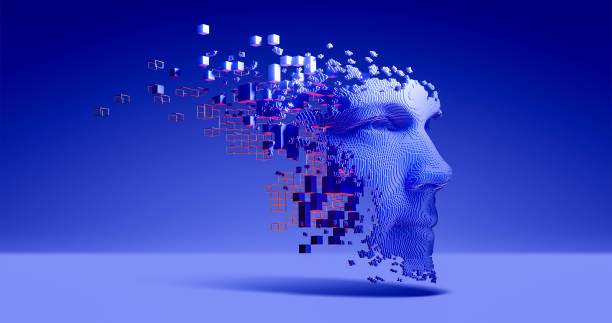What is Artificial Intelligence? Definitions and Basic Concepts
#Artificial_Intelligence (AI) is a branch of computer science that deals with building intelligent machines capable of performing tasks that usually require human intelligence.
These tasks include learning, reasoning, problem-solving, natural language understanding, pattern recognition, and decision-making.
Artificial intelligence attempts to model human thinking processes and implement them in computer systems.
Wikipedia defines Artificial Intelligence as: “Intelligence demonstrated by machines, as opposed to the natural intelligence displayed by humans and animals”.
In short, artificial intelligence seeks to build systems that can think, learn, and act like humans.
These systems can be used in various fields such as medicine, engineering, economics, gaming, etc.
This field includes several sub-branches, including machine learning, deep learning, natural language processing, and computer vision.
Each of these sub-branches deals with a specific aspect of artificial intelligence and has its own tools and techniques.
For example, machine learning allows systems to learn from data and improve their performance without explicit programming.
While natural language processing helps systems understand and generate human language.
Overall, artificial intelligence is a broad and dynamic field that is rapidly advancing and has great potential for solving complex problems and improving human lives.
#AI systems can analyze data, make accurate decisions, and assist humans in various fields.
The use of artificial intelligence in various industries, including healthcare, manufacturing, and financial services, has led to improved efficiency and reduced costs.
Also, artificial intelligence plays a significant role in the development of self-driving cars and intelligent robots, which can create massive transformations in transportation and production.
Are you tired of your online store having visitors but no sales? Rasaweb solves your core problem with professional online store design!
✅ Significant increase in sales with targeted design
✅ Perfect user experience for your customers
⚡ Get a free consultation!
A Brief History of Artificial Intelligence From the Beginning to Today
The idea of #Artificial_Intelligence dates back to the 1950s, when researchers began exploring the possibility of building intelligent machines.
One of the early milestones was the creation of the “Logic Theorist” program in 1956, which could prove mathematical theorems.
The Dartmouth Conference in the same year is considered the official starting point of artificial intelligence.
Click here to preview your posts with PRO themes ››
In the 1960s and 1970s, significant advances were made in the field of expert systems, systems that collected specialized knowledge in a specific area and used it to solve problems.
However, these systems had limitations, including the need for manual knowledge and the inability to learn from data.
In the 1980s, machine learning emerged as a new approach that allowed systems to learn from data.
This approach led to the development of new algorithms such as neural networks and decision trees.
However, the lack of data and sufficient computing power limited the progress of this field.
In recent decades, with the increasing volume of data and advances in hardware, deep learning has emerged as a powerful sub-branch of machine learning.
Deep neural networks have achieved excellent results in fields such as computer vision, natural language processing, and speech recognition.
Today, #Artificial_Intelligence is transforming many industries and has great potential for solving complex problems and improving human lives.
The development trend of #Artificial_Intelligence shows that this field is still growing and evolving, and with continuous progress, we will see wider applications of it in everyday life.
Types of Artificial Intelligence From Expert Systems to Deep Learning
There are different types of artificial intelligence, each with its own characteristics and applications based on the approach and techniques used.
One common classification is dividing artificial intelligence into two general categories: “Weak AI” (Narrow AI) and “Strong AI” (General AI).
Weak artificial intelligence refers to systems that are designed to perform a specific task and perform well in that limited area.
For example, a chess program or a facial recognition system are examples of weak artificial intelligence.
These systems cannot operate outside their area of expertise and do not have the ability to learn and reason generally.
Click here to preview your posts with PRO themes ››
Strong artificial intelligence refers to systems that can perform any task that a human is capable of doing.
These systems have the ability to learn, reason, solve problems, and understand natural language in a general way, and can operate in various fields.
Strong artificial intelligence is still in the early stages of development and achieving it is one of the long-term goals of #Artificial_Intelligence researchers.
In addition, artificial intelligence can also be categorized based on the techniques used.
Expert systems, machine learning, deep learning, natural language processing, and computer vision are examples of this classification.
Each of these techniques addresses a specific aspect of artificial intelligence and has its own tools and algorithms.
For example, deep learning, using deep neural networks, has achieved excellent results in fields such as computer vision and natural language processing.
This technique allows systems to recognize complex patterns in data and make decisions based on them.
Ultimately, choosing the right type of artificial intelligence depends on the type of problem and the desired goals.
For specific and limited problems, weak artificial intelligence may be sufficient.
But for complex and general problems, there is a need to develop strong artificial intelligence and use more advanced techniques such as deep learning.
Applications of Artificial Intelligence in Various Industries From Medicine to Transportation
#Artificial_Intelligence, as a transformative technology, is changing many industries and aspects of our daily lives.
The applications of artificial intelligence are very broad and diverse and can be seen in various fields.
In the field of medicine, artificial intelligence can help diagnose diseases, develop drugs, and provide personalized healthcare.
Artificial intelligence systems can analyze medical images and diagnose diseases with higher accuracy.
Also, artificial intelligence can play a significant role in discovering new drugs and improving treatment processes.
Click here to preview your posts with PRO themes ››
In the transportation industry, artificial intelligence plays a key role in the development of self-driving cars.
Self-driving cars can move on the roads without the need for a human driver, using sensors and artificial intelligence algorithms.
This technology can help reduce accidents, improve transportation efficiency, and reduce air pollution.
In the manufacturing field, artificial intelligence can help improve production processes, reduce costs, and increase the quality of products.
Intelligent robots can perform repetitive and dangerous tasks, and artificial intelligence systems can analyze production data and suggest necessary improvements.
In the financial services industry, artificial intelligence can help detect fraud, manage risk, and provide personalized financial services.
Artificial intelligence systems can monitor financial transactions and identify suspicious patterns.
Also, artificial intelligence can help customers with financial management and investment.
In addition, #Artificial_Intelligence has wide applications in other fields such as education, agriculture, marketing, and entertainment.
With continuous advances in this field, it is expected that the applications of artificial intelligence will become wider and more diverse in the future.
In general, #Artificial_Intelligence has great potential for solving complex problems and improving human lives and can be used as a powerful tool in various industries.
| Industry | Application |
|---|---|
| Medicine | Disease diagnosis, drug development |
| Transportation | Self-driving cars |
| Manufacturing | Process improvement, cost reduction |
| Financial services | Fraud detection, risk management |
Are you tired of your online store having visitors but no sales? Rasaweb solves your core problem with professional online store design!
✅ Significant increase in sales with targeted design
✅ Perfect user experience for your customers
⚡ Get a free consultation!
Advantages and Disadvantages of Artificial Intelligence A Realistic View
#Artificial_Intelligence, like any other technology, has its own advantages and disadvantages that should be considered.
A realistic review of these advantages and disadvantages can help us use this technology responsibly and effectively.
Among the advantages of artificial intelligence are: improved efficiency and productivity, reduced costs, increased accuracy, solving complex problems, providing personalized services, and improving quality of life.
#Artificial_Intelligence systems can perform repetitive and time-consuming tasks quickly and with high accuracy, which leads to increased efficiency and productivity.
Also, artificial intelligence can reduce costs by reducing errors and improving processes.
On the other hand, artificial intelligence also has disadvantages that should be considered.
Among these disadvantages are job loss, discrimination, security issues, dependence on data, complexity, and development costs.
With the automation of processes, many jobs may be lost and this may lead to increased unemployment.
Also, artificial intelligence systems may be trained based on incomplete or discriminatory data, which may lead to unfair decision-making.
In addition, security issues are also among the important challenges in the field of artificial intelligence.
#Artificial_Intelligence systems may be subject to cyberattacks and disclose sensitive information.
Also, dependence on data can be a serious limitation, as artificial intelligence systems need sufficient and high-quality data to function well.
Finally, the development and implementation of #Artificial_Intelligence systems can be very complex and costly.
To build efficient artificial intelligence systems, various expertise and significant financial resources are needed.
Therefore, for the effective and responsible use of #Artificial_Intelligence, we must pay attention to its advantages and disadvantages and try to benefit from the advantages and reduce the disadvantages.
The Future of Artificial Intelligence Predictions and Key Trends
The future of #Artificial_Intelligence is very bright and full of potential.
With continuous advances in this field, #Artificial_Intelligence is expected to play a more important role in our daily lives and create huge transformations in various industries.
One of the key trends in the future of #Artificial_Intelligence is the development of strong artificial intelligence.
Although we are still in the early stages, researchers are trying to create systems that can perform any task that a human is capable of doing.
Achieving strong artificial intelligence can create huge transformations in various fields and help solve complex problems.
Another trend that is expected to be prominent in the future of #Artificial_Intelligence is the increased use of deep learning.
Deep neural networks have achieved excellent results in fields such as computer vision, natural language processing, and speech recognition, and are expected to play a more important role in the development of artificial intelligence systems in the future.
Also, the use of #Artificial_Intelligence in the Internet of Things (IoT) is expected to increase.
By connecting various devices to the internet, a huge volume of data is generated that can be analyzed by #Artificial_Intelligence systems.
This can lead to improved efficiency and productivity in various fields.
In addition, ethical and legal issues related to #Artificial_Intelligence are expected to receive more attention in the future.
With the expansion of the use of #Artificial_Intelligence, there is a need to وضع قوانین و مقرراتی است که از حقوق و حریم خصوصی افراد محافظت کند و از سوء استفاده از این فناوری جلوگیری کند. (This part is not in English, it states a need to make laws and regulations to protect rights and privacy of individuals and prevent misuse of this technology)
In general, the future of #Artificial_Intelligence is very promising and it is expected that this technology will play an important role in solving global problems and improving human lives.
| Trend | Description |
|---|---|
| Development of Strong #Artificial_Intelligence | Creating systems that can perform any task. |
| Increased use of Deep Learning | Improving the performance of #Artificial_Intelligence systems in various fields. |
| #Artificial_Intelligence and the Internet of Things | Analyzing data generated by devices connected to the internet. |
| Ethical and Legal Issues | Enacting laws and regulations to protect rights and privacy. |
Challenges Facing Artificial Intelligence From Ethics to Security
In addition to its many potentials, #Artificial_Intelligence also faces important challenges that should be considered.
These challenges include ethical, security, social, and economic issues.
One of the most important challenges is the ethical issues related to #Artificial_Intelligence decision-making.
#Artificial_Intelligence systems may find themselves in situations where they need to make difficult and complex decisions.
For example, a self-driving car may find itself in a situation where it must choose between saving the lives of its passengers and pedestrians.
In such situations, ethical decision-making is very difficult and requires careful review and the determination of ethical criteria.
Another challenge is the security issues related to #Artificial_Intelligence.
#Artificial_Intelligence systems may be subject to cyberattacks and disclose sensitive information.
Also, #Artificial_Intelligence systems can be used for malicious purposes.
For example, #Artificial_Intelligence systems can be used to create fake news, spread misinformation, and manipulate public opinion.
In addition, social and economic issues are also among the important challenges in the field of #Artificial_Intelligence.
With the automation of processes, many jobs may be lost and this may lead to increased unemployment.
Also, #Artificial_Intelligence can lead to increased economic inequality, as companies that have access to this technology can earn more profit.
To address these challenges, there is a need to enact laws and regulations that protect the rights and privacy of individuals and prevent misuse of this technology.
Also, there is a need for public education and awareness about #Artificial_Intelligence so that people can use this technology responsibly and effectively.
How to Learn Artificial Intelligence Resources and Guidance
Learning #Artificial_Intelligence can be an exciting and rewarding path.
Given the increasing expansion of applications of #Artificial_Intelligence, having knowledge and skills in this field can provide many job opportunities.
To start learning #Artificial_Intelligence, you can use various resources.
One of the best resources is online courses offered by reputable universities and educational institutions.
These courses usually include basic and advanced topics of #Artificial_Intelligence, machine learning, deep learning, and natural language processing.
In addition to online courses, you can also use books and scientific articles.
Textbooks usually explain the basic concepts completely, and scientific articles examine the latest advances and achievements in the field of #Artificial_Intelligence.
Also, participating in #Artificial_Intelligence workshops and conferences can be a good opportunity to learn from experts and exchange ideas with other enthusiasts.
In these workshops and conferences, the latest #Artificial_Intelligence techniques and tools are usually introduced, and participants can become familiar with them.
To practice and implement #Artificial_Intelligence concepts, you can use open-source tools such as TensorFlow and PyTorch.
These tools provide extensive facilities for building and training #Artificial_Intelligence models.
Finally, to succeed in learning #Artificial_Intelligence, you need patience, persistence, and continuous practice.
#Artificial_Intelligence is a complex and dynamic field, and mastering it requires continuous effort and follow-up.
Are you aware that a weak corporate website is costing you many opportunities daily? Solve this problem forever with professional corporate website design by Rasaweb!
✅ Creating a powerful and reliable image of your brand
✅ Targeted attraction of new customers and increased sales
⚡ [Get a free website design consultation]
The Impact of Artificial Intelligence on Our Daily Lives What Changes Are Coming
#Artificial_Intelligence is gradually infiltrating our daily lives and creating significant changes in how we live, work, and interact with the world around us.
One of the most important impacts of #Artificial_Intelligence is process automation.
#Artificial_Intelligence systems can perform repetitive and time-consuming tasks quickly and with high accuracy, which leads to increased efficiency and productivity.
For example, in the manufacturing industry, intelligent robots can perform assembly and packaging tasks, and in the service industry, chatbots can answer customer questions.
Another impact of #Artificial_Intelligence is the provision of personalized services.
#Artificial_Intelligence systems can analyze user data and, based on them, provide services and products tailored to their needs.
For example, in the e-commerce industry, recommender systems can suggest products that users are interested in, and in the healthcare industry, #Artificial_Intelligence systems can provide personalized treatment plans.
In addition, #Artificial_Intelligence can help improve our quality of life.
#Artificial_Intelligence systems can help diagnose diseases, manage energy, improve security, and provide welfare services.
For example, in the smart city, #Artificial_Intelligence systems can manage traffic, optimize energy consumption, and prevent crime.
In general, #Artificial_Intelligence has great potential to improve our daily lives and is expected to play a more important role in our lives in the future.
Legal and Ethical Issues of Artificial Intelligence What Laws Should Be Enacted
With the expansion of applications of #Artificial_Intelligence, legal and ethical issues related to this technology are also becoming more important.
For the responsible and effective use of #Artificial_Intelligence, there is a need to enact laws and regulations that protect the rights and privacy of individuals and prevent misuse of this technology.
One of the most important legal issues is accountability for #Artificial_Intelligence decision-making.
If an #Artificial_Intelligence system makes a wrong decision and harms someone, who will be responsible The system manufacturer, the user, or the system itself This is a question that needs to be answered.
Another issue is privacy and data protection.
#Artificial_Intelligence systems need a lot of data to function well, and this data may include personal and sensitive information of individuals.
To prevent misuse of this data, there is a need to enact laws and regulations that protect the privacy of individuals.
In addition, ethical issues are also among the important challenges in the field of #Artificial_Intelligence.
#Artificial_Intelligence systems may be trained based on incomplete or discriminatory data, which may lead to unfair decision-making.
To prevent this, there is a need to develop fairer and more equitable algorithms.
Also, there is a need for public education and awareness about #Artificial_Intelligence so that people can use this technology responsibly and effectively.
People should be aware of what #Artificial_Intelligence is, how it works, and what risks and opportunities it entails.
In general, for the responsible and effective use of #Artificial_Intelligence, there is a need to enact laws and regulations that protect the rights and privacy of individuals and prevent misuse of this technology.
Also, there is a need for public education and awareness about #Artificial_Intelligence so that people can use this technology responsibly and effectively.
These laws and regulations should be drafted considering the legal, ethical, social, and economic issues related to #Artificial_Intelligence.
FAQ
| Question | Answer |
|---|---|
| What is the definition of Hoosh Masnooei (Artificial Intelligence)? | It is a field in computer science that aims to create intelligent machines that can think, learn, solve problems, and make decisions like humans. |
| Mention some common applications of Artificial Intelligence. | Includes self-driving cars, voice assistants (such as Siri and Alexa), recommendation systems (such as Netflix and Amazon), facial recognition, and medical diagnosis. |
| What is the difference between Narrow AI (ANI) and General AI (AGI)? | Narrow AI is specialized in one specific task, while General AI possesses human-level intellectual ability to perform any cognitive task. |
| What is Machine Learning and its relationship to Artificial Intelligence? | Machine learning is a branch of artificial intelligence that focuses on developing algorithms that allow systems to learn from data without explicit programming. |
| What are Artificial Neural Networks? | They are computational models inspired by the structure and function of the human brain, used in deep learning to process data and discover complex patterns. |
| Mention some ethical challenges related to Artificial Intelligence. | Includes privacy issues, bias in data and algorithms, job loss, and responsibility in case of errors or unfair decisions. |
| What is Natural Language Processing (NLP)? | It is a branch of artificial intelligence that focuses on enabling computers to understand, interpret, and generate human language in a useful and interactive way. |
| How can Artificial Intelligence affect the job market? | It can lead to the automation of some routine tasks, requiring retraining of workers and creating new jobs in the fields of designing, developing, and maintaining Artificial Intelligence systems. |
| What is Computer Vision? | It is a field in Artificial Intelligence that enables computers to “see,” understand, and interpret images and videos in the same way that humans do, enabling them to recognize objects and faces. |
| What is the importance of data in developing Artificial Intelligence systems? | Data is the fuel that feeds Artificial Intelligence systems, especially in machine learning. The quality and quantity of data significantly affect the accuracy and performance of models and their ability to learn and make correct decisions. |
And other services of Rasa Web Advertising Agency in the field of advertising
Intelligent Sales Automation: A quick and efficient solution for analyzing customer behavior with a focus on precise audience targeting.
Intelligent Direct Marketing: Designed for businesses looking to increase click-through rates through an SEO-driven content strategy.
Intelligent Data Analysis: A dedicated service to increase site visits based on the use of real data.
Intelligent Conversion Rate Optimization: A novel service for increasing online growth through an SEO-driven content strategy.
Intelligent Customer Journey Map: Professional optimization to increase click-through rates using Google Ads management.
And over a hundred other services in the field of internet advertising, advertising consulting, and organizational solutions
Internet Advertising | Advertising Strategy | Advertorial
Sources
AI is about to rewire the world economy
,What is AI?
,The Comprehensive AI Guide
,What is artificial intelligence? Everything you need to know
? Are you ready to grow your business in the digital world? With the comprehensive services of Rasaweb Afarin Digital Marketing Agency, including online store design and SEO optimization, have a powerful presence in the online market.
📍 Tehran, Mirdamad Street, next to the Central Bank, South Kazeroun Alley, Ramin Alley No. 6
“`














